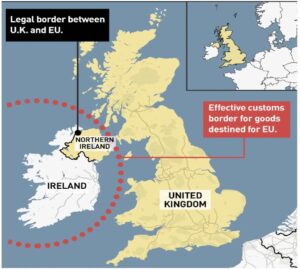In news- The UK has demanded “significant” changes to Northern Ireland’s post-Brexit trading arrangements.
About Northern Ireland Protocol-
- The Northern Ireland Protocol helps prevent checks along the land border between Northern Ireland (in the UK) and the Republic of Ireland (in the EU).
- During Brexit negotiations, all sides agreed that protecting the 1998 Northern Ireland peace deal (the Good Friday agreement) was an absolute priority.
- Part of that meant keeping the land border open and avoiding new infrastructure such as cameras and border posts and no checks were needed on goods travelling from one country to another.
- After Brexit, the EU requires many goods – such as milk and eggs – to be inspected when they arrive from non-EU countries, while some products, such as chilled meats (sausages), aren’t allowed to enter at all from non-member countries such as the UK.
- Under the protocol it was agreed that Northern Ireland would continue to follow EU rules on product standards (known as the single market) to prevent checks along the border.
- Checks would instead take place on goods entering Northern Ireland from England, Scotland or Wales.

- This has prompted criticism that a new border has effectively been created in the Irish Sea.
- The agreement came into force on 1 January 2021 and is now part of international law.
- Now, the UK government wants to get rid of most of the checks, and reduce the customs procedures, in order to allow goods to flow more freely.
- It also wants to remove the role the European Commission and the European Court of Justice have in overseeing how the protocol works.
- Article 16 of the protocol allows either side to suspend any part of the agreement that causes “economic, societal or environmental difficulties”.
- The EU has insisted that the UK must implement the terms of the protocol.
- Though the EU is ready to continue searching for “creative solutions”, it is not agreeing for a renegotiation.
More information- http://UK law and Brexit – JournalsOfIndia
















